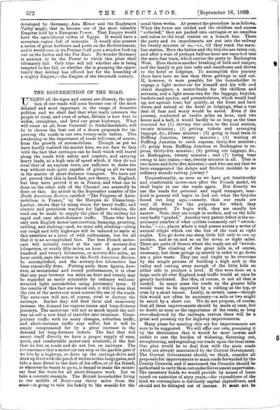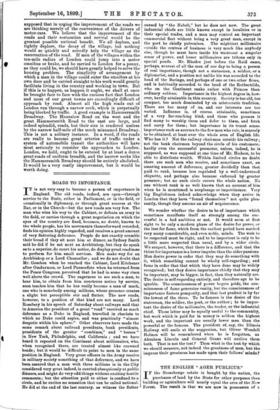THE RESURRECTION OF THE ROAD. u - NLESS all the signs and
omens are illusory, the ques- tion of our roads will soon become one of the most debated and most important in the range of domestic politics, and we shall find that what really interests the people of rural, and even of urban, Britain is how best to widen, straighten, and level our great highways. What will rouse us all, from Cornwall to Sutherlandshire, will be to choose the best out of a dozen proposals for im- proving the roads in our own twenty-mile radius. This awakening to the importance of roads will come, of course, from the growth of automobilism. Though as yet we have hardly realised the matter here, we are face to face with the fact that carriages can be built which will travel along the roads with safety and comfort, and carrying heavy loads, at a high rate of speed which, if they do not rival that of an express train, are sufficient to make the way without rails quite capable of giving us all we want in the matter of short-distance transport. We have not yet proved that this is hard fact, not theory, in England, but they have proved it so in France, and what can be done on the other side of the Channel can assuredly be done on this. An article in the September number of the North American Review, entitled " The Progress of Auto- mobilism in France," by the Marquis de Chasseloup- Laubat, shows that by using steam for heavy traffic, and electric and petroleum traction for lighter vehicles, the road can be made to supply the place of the railway for rapid and easy short-distance traffic. Those who have only seen English motor-cars snorting, bumping, grunting, rattling, and shaking—and, we must add, stinking—along our rough and hilly highways will be induced to smile at this assertion as a piece of wild enthusiasm, but for all that it is an accomplished fact. The best French motor- cars will actually travel at the rate of seventy-five kilometres, or nearly fifty miles, an hour. A pace of one hundred and twenty kilometres, or seventy-five miles, an hour could, says the writer in the North. American. Review, be accomplished, and the seventy-five kilometres has been repeatedly done. Putting aside these figures, how- ever, as sensational and record performances, it is clear that any pace between ten miles an hour and twenty may be regarded as easily attainable by ordinary well-con- structed light automobiles using pneumatic tyres. If the results of this fact are traced out, it will be seen that the rise of the motor-car must restore the use of the roads. The auto-cars will not, of course, rival or destroy the railways. Rather they will feed them and immensely increase the demand for express trains and long-distance journeys. The motor-car will not so much injure the rail- way as call a new kind of traveller into existence. Cross- journey traffic with its many changes, suburban traffic, and short-distance traffic may suffer, but it will be amply compensated for by a great increase in the demand for long-distance tickets. The fact that will assert itself directly we have a proper supply of easy, quick, and comfortable motor-cars available, is the fact that we live on roads and do not live on railways. The circumstance that a motor-car can stop at the garden gate if we live by a highway, or drive up the carriage-drive and draw up level with the porch if we live within lodge gates, and take a man direct to the door of his office, or of his friend, or wherever he wants to go to, is bound to make the motor- car beat the train for all short-distance work. Let us take a concrete example. The British householder living in the middle of Kent—say thirty miles from the coast—is going to take his family to the seaside for the usual three weeks. At present the procedure is as follows. When the boxes are corded and the children and nurses- " collected," they are packed into carriages or an omnibus and taken to the local station on a branch line. There the party and its impedimenta are put into the railway for twenty minutes or so,—i.e., till they reach the main- line station. Here the babies and the bicycles are taken out, and after a wait of perhaps half-an-hour are repacked into the main-line train, which carries the party to Bathington West. Here there is another breaking of bulk and temper, and the family is got into cabs and omnibuses and driven to the hotel or lodgings. To accomplish this journey there have been no less than three gettings in and out. If, however, it were possible for the householder to engage a light motor-car for himself and.. his wife and eldest daughter, a motor-brake for the children and servants, and a light steam-van for the luggage, bicycles, buckets and spades, and perambulators, which would load up, not against time, but quietly, at the front and back doors, and unload at the hotel or lodgings, what a vast deal of fuss and worry would be saved. Even if the journey, conducted at twelve miles an hour, took two hours and a half, it would hardly be so long as the time required for (1) driving two miles to the local station, twenty minutes ; (2) getting tickets and arranging luggage, &c., fifteen minutes ; (3) going in local train to Buffiing Junction, twenty minutes ' • (4) waiting at Baffling Junction to catch express, thirty-five minutes ; (5) going from 'Buffing Junction to Bathington in ex- press,• thirty-five minutes ; (6) 'getting out luggage, &e., at Bathington, twenty minutes ; and (7) losing time owing to late trains,—say, twenty minutes in all. That is two hours and forty-five minutes,—and who can say that we have exaggerated the delays and friction incident to an ordinary seaside railway journey ?
Unquestionably, as soon as we have got trustworthy and comfortable motor-care after the French model, we shall begin to use the roads again. But directly we use the roads for personal and rapid transport, man- kind in general will begin to fiud out what the bicycles found out long ago,—namely, that our roads are very ill fitted for the purposes for which they are designed. To begin with, they are usually too narrow. Next, they are rough in surface, and on the hills very badly "graded." Another very patent defect is the un- necessary number of what cyclists commonly call " switch- backs,"—i.e., places where a road passes across a series of natural ridges which cut the line of the road at right angles. You go down one steep little hill only to run up another, and so on and so on for seven or eight miles. There are parts of Sussex where the roads are all "switch- back." The climbing of the great hills is, of course, necessary, but these goings up merely in order to go down are a pure waste. They can and ought to be overcome by the simple process of building a high arch in the valley and cutting away enough of the little hills on either side to produce a level. If this were done on a large scale all over England road traffic would at once be greatly facilitated. But this, of course, is not all that is needed. In many cases the roads up the greater hills would want to be improved by a cutting at the top, or even by a short tunnel. Lastly, in certain cases—though this would not often be necessary—a mile or two might be saved by a short cut. We do not propose, of course, that all these improvements should be made at once, but no doubt as soon as the importance of the roads, so long over-shadowed by the railways, revives there will be a great and pressing cry for highway improvements.
Many plans for meeting this cry for improvements are sure to be suggested. We will offer our own, premising it by the declaration that it would be most unwise and unfair to cast the burden of widening, flattening out, straightening, and regrading our roads upon the local rates. Our plan would be to deal first with the main roads which are already maintained by the Central Government. The Central Government should, we think, consider all proposals for improvements to main roads forwarded by the County Councils, and if sanctioned the Councils should be authorised to carry them out under Government supervision. The necessary funds we would provide by means of loans raised on annuities of sixty years,—for expenditure of the kind we contemplate is distinctly capital expenditure, and should not be defrayed out of income. It must not. be
supposed that in urging the improvement of the roads we are thinking merely of the convenience of the drivers of motor-cars. We believe that the improvement of the roads and their restoration and revival would be the greatest possible national benefit. We all deplore, and rightly deplore, the decay of the village, but nothing would so quickly and soundly help the village as the resurrection of the road. If men of the villages within the ten-mile radius of London could jump into a motor omnibus or brake, and be carried to London for a penny, as they could be, we should have greatly helped to solve the housing problem. The simplicity of arrangement by which a man in the village could enter the omnibus at his own door and be carried straight to his work would greatly facilitate living in the country and working in town. But if this is to happen, as happen it ought, we shall at once be brought face to face with the curious fact that London and most of our great towns are exceedingly difficult of approach by road. Almost all the high roads out of London run through a narrow neck, which is perpetually being blocked by traffic. A good example is Hammersmith Broadway, The Hounslow Road on the west and the great Hammersmith Road to the east are large, and indeed splendid, roads, but their size is rendered useless by the narrow half-mile of the much misnamed Broadway. This is not a solitary instance. In a word, if the roads are really to become great arteries of traffic under a system of automobile transit the authorities will have most seriously to consider the approaches to London. London, we hold, ought to be entered by at least a dozen great roads of uniform breadth, and the narrow necks like the Hammersmith Broadway should be entirely abolished. It would be a very costly improvement, but it would be worth doing.



































 Previous page
Previous page